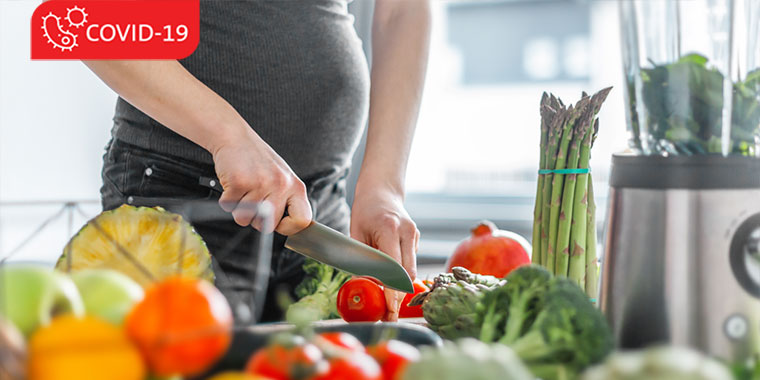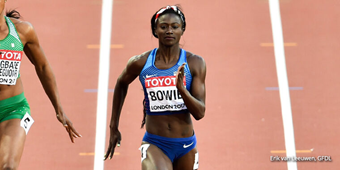Healthy Advice About Nutrition, Pregnancy, And COVID-19

Answer a few questions and we'll provide you with a list of primary care providers that best fit your needs.
Of course you want to eat healthy when you’re pregnant. But does COVID-19 mean you need to change anything about your diet?
During pregnancy it’s important to get adequate calories and to stay hydrated, says Olivia Phillips, RD, LD, CNSC, CPT, registered dietitian with Miami Valley Hospital’s maternal-fetal medicine department. But some moms think because they have this little person growing inside them, they can eat twice the calories. “Not only is that not healthy, it results in not feeling well,” she says.
Instead, when you’re pregnant, a healthy diet should have the right balance of carbohydrates, proteins, and healthy fats, as well as micro-nutrients like iron, folate, calcium, and vitamin D. But because every pregnant woman is different, Phillips recommends asking your doctor or dietitian for specific advice.
Can a Healthy Diet Help Me Fight Infection?
A healthy diet will boost your immune system, says Phillips. “But remember, your immunity is a ‘system,’ so it relies on more than just what you eat. All of your bodily functions need to be healthy.” You also need plenty of sleep, exercise, and you need to stay hydrated. Drinking plain water is ideal. “Or if you can’t tolerate the taste of water, I suggest adding lemon juice or drinking beverages that are free of caffeine and sugar.”
Phillips cautions her patients to be wary of foods or supplements currently being promoted on the internet that can heighten your body’s ability to fight infection. There isn’t a magic bullet, or just one thing that makes you immune to a virus, she says.
Can My Diet Help Lower My Stress About COVID-19?
Yes, says Phillips. “When you eat better, you’ll feel better, and that alone will reduce your stress.” If spending more time at home means you have more free time, Phillips suggests working on meal planning or finding new ideas in the kitchen. “Focus on eating better and feeling better. Make it a new hobby while you have the time!”
What Foods Should I Keep In Stock?
Avoid junk food, says Philips, because when boredom sets in, it may be too tempting. “When we eat junk food, we don’t feel good.” This includes over-processed foods like Pop Tarts, chips, pretzels, cakes, and cookies that tend to have lots of sugar and other ingredients and come from a factory. “A good rule of thumb,” she says, “is to look for foods that have fewer than five ingredients.”
Ideally your shopping list should contains lots of fruits and vegetables. “The different colors indicate different nutrients, and that’s important,” says Phillips. Prepare your fresh produce first before it goes bad, and freeze the leftovers. “It’s okay to also buy frozen fruits and vegetables, and also canned, as long as they are low in sodium and stored in water instead of heavy syrup.”
Can I Rely On Carry-Out Food?
Food safety is really important anytime during pregnancy, says Phillips. “If you get carry-out, make sure it’s from a place that you trust, with good standards and hygiene.” Because many restaurants now are providing carry-out for the first time, it’s important to be sure the food is held to a temperature that keeps it safe. “If it doesn’t smell right or look right, don’t eat it.”
Where Can I Find Reliable Advice About Nutrition And Pregnancy?
We’re in uncharted territory right now, so be sure to take advice from people you trust, or from your doctor or a registered dietitian, Phillips cautions. She recommends Lily Nichols, a registered dietitian/nutritionist and certified diabetes educator whose website is devoted to nutrition during pregnancy.
In addition, the American College of Obstetricians and Gynecologists provides nutrition advice for women during pregnancy, as does the Academy of Nutrition and Dietetics.
Answer a few questions and we'll provide you with a list of primary care providers that best fit your needs.
Source: Olivia Phillips, RD, LD, CNSC, CPT, Miami Valley Hospital; American College of Obstetricians and Gynecologists; Academy of Nutrition and Dietetics





